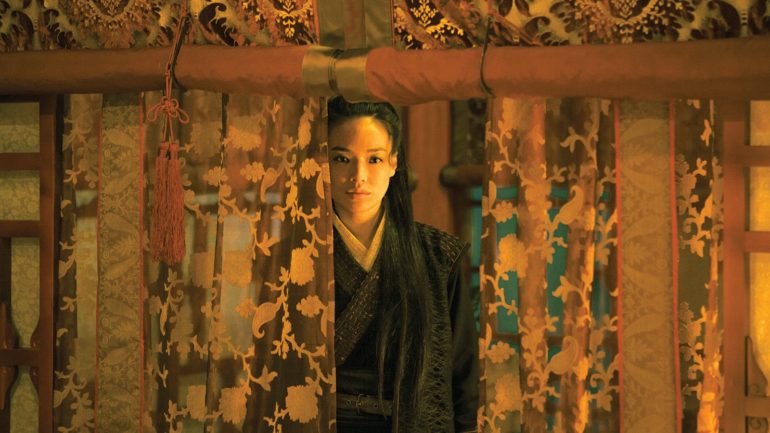As acclaimed as he is, director Hsiao-Hsien Hou does not seem a likely candidate for a wuxia film (Perhaps the praise is part of the problem?). The energetic tales of Heroes riding around on Crouching Tigers are a world apart from Hou’s oeuvre, with beautiful shots of such determined composition that they lapse into the austere. The requisite balletic bouts are present and correct in The Assassin, but the narrative context doesn’t flows as fluidly as the royal gowns sported herein.
The Assassin takes place in 9th-century China, amidst warring between the provinces. Dealing with the corrupt leaders who wage these wars is Nie Yinniang, a deadly killer who swoops in on her targets with moves as efficient as they are graceful. Nie is brought to deadly life by Qi Shu, an actress blessed with compelling onscreen presence. She brings a death stare and natural warmth & beauty together in a wonderful performance, providing a beating heart to a film that occasionally gets lost in its own visuals. This is a problem when trying to keep track of a plot that feels more complex than it really needs to be. Chalk it up to a relative dearth of clear explanations. It boils down to a clash of loyalties, as Nie is tasked to assassinate governor Tian Ji’an (Chen Chang), the man to whom Nie was once betrothed. Chang elevates Tian beyond boo-hiss nemesis, and there is a genuine thrill at the prospect of he and Nie facing off. Will she complete the mission, or can his personal and political griefs dissuade her?
For his work on The Assassin, Hou was garlanded with the Best Director prize at Cannes this year, and it’s easy to see why. In collaboration with regular DoP Ping Bin Lee, he creates images saturated in colour. The title card comes up against a blue landscape silhouetted against a fiery orange sunset. The glistening golds and maroon silks of the costumes and jewels dazzle throughout. The opening prologue, a 4:3 retelling of Nie’s early days, is delivered in crisp monochrome. Meanwhile, the fight scenes are delivered with a staggering blend of precise choreography and stealth. Nie prowls the rafters and roofs of her targets, panther-like and waiting to make the deadly pounce. Alas, that stealth also means the fights are quite brief in the context of the film as a whole. When the fights look this good, but the plot’s energy has slowed, a little more of the action wouldn’t have hurt.
The script isn’t the problem; based on Xing Pei’s short story, there’s sufficient intrigue and character to proceedings. What it lacks is momentum; there are moments to give pause, and then there are just pauses. Fascinating as the mesh of personal an political intrigue could be, Hou just spends too long on scenes of rigourously-designed opulence to allow us to get involved. It’s a pity, because the design and lead performance are too good to allow The Assassin to be anything less than noteworthy. Woody Allen’s comparison of relationships to sharks springs to mind. The Assassin is no dead shark, but its lack of drive means it hasn’t quite got the bite it should.

